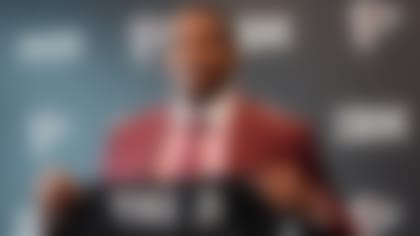Michael Vick tried to tell us. It was nearly two years ago that Vick first said Lamar Jackson was five times better than Vick was at Virginia Tech, a take so hot that it was too easily dismissed by a nation of fans and writers that can't imagine anyone quite like young Vick. At least not until now.
Vick called Jackson his "spitting image" in a terrific episode of Daniel Jeremiah and Bucky Brooks' "Move The Sticks" podcast, a reminder that the most obvious player comparison is sometimes the right one. Jackson's frame may be thinner than Vick's, but it's easy to argue Jackson showed more toughness as a runner and more skills as a pocket passer than Vick did in school. That's one of the many reasons why Jackson's casual relegation to the second tier of quarterback prospects behind the "Big Four" never added up. It sounded like predictable groupthink before one of the most unpredictable days on the NFL calendar.
Jackson's status is just one of the big draft questions out there, with the fun finally about to start ...
Have we all been wrong about Lamar Jackson?
Underrating Jackson is the type of mistake draft analysts make again and again. Just last year, conventional pre-draft wisdom didn't have Deshaun Watson or Patrick Mahomes being selected within the first 24 picks. Not only did both get drafted much earlier (Mahomes at No. 10 overall by the Chiefs and Watson at No. 12 by the Texans) -- they inspired teams to make franchise-altering trades to move up for them. Or consider 2011, when there was debate before the draft as to whether Christian Ponder and Jake Locker would go in the first round. They both went in the top 12.
Watson's draft experience and rookie success are both instructive. After finishing second in the Heisman Trophy voting to Jackson in 2016, Watson was another college superstar who was nitpicked during the pre-draft process by analysts getting hung up on short-sighted reasons to think his transition to the NFL wouldn't work. Except teams like the Texans didn't see him that way at all. They smartly focused on Watson's positive traits and how those traits could fit into the changing dynamics of an increasingly shotgun-heavy, spread-loving league that rewards players who can create in space. Watson rewarded them with a stellar first half, putting himself in the Offensive Rookie of the Year discussion before suffering a torn ACL in November. Not only did Jackson run a "pro-style" offense at Louisville, but the NFL is better built to take advantage of his skills than the Falcons were with Vick back in 2001. Teams like the Eagles with Carson Wentz, the Chiefs with Mahomes and the Rams with Jared Goff have shown what can happen when college concepts are integrated with the pro game, meeting QBs halfway.
Former Cardinals coach Bruce Arians gave a window into how some coaches view Jackson's potential, joking to the Arizona Republic that he'd come out of retirement to coach Jackson. The vision and elusiveness Jackson shows as a runner is breathtaking, but Arians emphasized that Jackson's not that raw as a passer. While his accuracy needs work, Jackson has already proven he can spin it down the field. Jackson completed multiple gems each game, often with a very Vick-like flick of the wrist.
A coach like Arians knows how maddening it would be to defend Jackson, the rare athlete at the highest levels of college football who routinely made his opponents look like weekend-warrior chumps. Critics contend he will have to adjust to the speed of NFL defenses, but NFL defenses will have to adjust to Jackson, because they haven't seen him before. It's not hyperbole to say his ceiling would be for him to join or surpass Vick as one of the great running quarterbacks of all time.
NFL players get drafted more on potential than production -- just look at Josh Allen's stock -- but Jackson should rank near the top in both categories among quarterbacks. His ceiling is through the roof, and his otherworldly athleticism arguably makes him a safer pick than his competitors, because it's so easy to see how it would translate at the next level. He'd benefit from learning from a veteran quarterback with a creative head coach, like Mahomes did last year under Alex Smith and Andy Reid in Kansas City, but that's true for any quarterback.
So many mock drafts still assume the NFL remains a risk-averse league, with many burying Jackson late in the first round or kicking him out of the round entirely. But the Texans, Chiefs and Eagles all made bold trades for athletic and supposedly raw quarterbacks over the last two years, with delicious results. The NFL is a better, more entertaining league when there is room for different playing styles and teams that are willing to embrace them. Some team is going to embrace Jackson on Thursday night, and it will be as if all this pre-draft nonsense never happened at all.
Will the Giants and Saquon Barkley demolish an outdated viewpoint?
The Giants organization's undying appreciation of Eli Manning is not a smokescreen. Owner John Mara made it clear late last season that he wanted Manning back in 2018. So Mara hired a general manager, Dave Gettleman, who believes Eli has good years left. Gettleman then hired a head coach in Pat Shurmur with a plan to help Manning play better.
This could prove to be short-sighted mistake in a quest to win nine games, especially when the Giants don't plan to be drafting so early in a QB-rich draft again anytime soon. Then again, no one is going to be complaining if Penn State running back Saquon Barkley gains 2,000 yards from scrimmage next season catching dump-offs from Eli.
Barkley is the best running back prospect since Adrian Peterson because he's nothing like Adrian Peterson. In this incarnation of the NFL, it would be foolish to take any running back high who doesn't excel on passing downs. The position is changing, and the increased emphasis on spread principles should only make the rare do-it-all running backs worth more than before. It is such an advantage for the Cowboys, Steelers, Rams and Cardinals to have running backs who can stay on the field all three downs, pass protect, run between the tackles and, most importantly, run routes like a wide receiver.
That flexibility opens up options for offenses to change tempo and dictate matchups at will. Barkley's vision and smooth style is reminiscent of LaDainian Tomlinson, with an extra 20 pounds of muscle added to the mix. Guys like Barkley, Le'Veon Bell, Todd Gurley and Ezekiel Elliott -- with their insane blend of size, speed and versatility -- were such rarities in the past, and it's fair to update how we view the position's value because the players and their roles are changing. There's no reason why a unicorn running back -- who doubles as a No. 3 receiver -- can't provide just as much value as a pass rusher or shutdown cornerback. Maybe even more.
That brings us back to the No. 2 overall pick. While the best value for the Giants would be to draft a quarterback or trade down, it will be hard to blame them if they draft Barkley over N.C. State pass rusher Bradley Chubb. Any draft dogma -- like not drafting a running back so high -- eventually becomes stale in a league that never stops evolving.
How will teams handle the offensive tackle shortage?
There aren't enough quality tackles in the NFL. Former Patriot Nate Solder was paid like a quarterback by the Giants because the decent tackles never make it to free agency. And now we have the second consecutive draft class without a premier tackle prospect, after Denver made Garett Bolles the first pick at the position at No. 20 overall one year ago.
This is the part where panicked teams often make mistakes, like when Ereck Flowers, Andrus Peat, Cameron Erving, Cedric Ogbuehi and D.J. Humphries all were taken within the first 24 picks of the 2015 draft. There is little agreement on this class, other than its overall lack of sure things. NFL Network's Daniel Jeremiah ranked only one tackle in his top 30 overall players, but the pressing league-wide problem at the position could result in a lot of teams reaching to fill a need and then hoping for the best.
Which quarterback is most likely to slide?
Josh Allen, more so than Jackson, has been the athletic marvel being alternately praised by NFL types and pilloried by draftniks throughout the last few months. I hesitate to call him "divisive," because that prefix should be retired with Jay Cutler, but Allen's teasing skill set inspires a lot of *strong opinions *.
While Josh Rosen, who some think might end up sliding in Round 1, could seemingly fit in any offense, Allen's frenetic reaction to pressure and missed routine throws should make him more of an acquired taste. There is still a strong undercurrent of love for Allen's tools despite his inaccuracy, so it's hard to imagine him falling too far. But if Allen gets past Denver at No. 5, there's a chance he could fall all the way to Buffalo, Arizona or Baltimore in the middle of the round.
Follow Gregg Rosenthal on Twitter @greggrosenthal.












